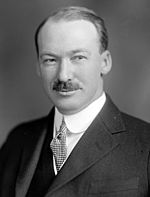William N. Vaile, Date of Birth, Place of Birth, Date of Death
TweetWilliam N. Vaile
American politician
 Date of Birth: 22-Jun-1876
Date of Birth: 22-Jun-1876
 Place of Birth: Kokomo, Indiana, United States
Place of Birth: Kokomo, Indiana, United States
Date of Death: 02-Jul-1927
Profession: lawyer, politician
Nationality: United States
Zodiac Sign: Cancer 
About William N. Vaile
- William Newell Vaile (June 22, 1876 – July 2, 1927) was a U.S.
- Representative from Colorado. Born in Kokomo, Indiana, Vaile moved with his parents to Denver, Colorado, in 1881.
- Vaile was of English descent.
- He attended the public schools and graduated from Yale University in 1898.
- During the Spanish–American War, he served as a private in the First Regiment of the Connecticut Volunteer Field Artillery from May 19, 1898, to October 25, 1898. Vaile studied law at the University of Colorado in 1899 and Harvard Law School in 1900–01.
- He was admitted to the bar in 1901 and began his practice in Denver.
- He was counsel for the Denver & Rio Grande Railroad, 1901–16, and he served as County Attorney for Jefferson County from 1911 to 1914.
- He married Kate Rothwell Varrell on June 14, 1914.
- Valie was a Republican candidate for Congress in 1916.
- He served on the Mexican border from June 28 to December 1, 1916, as a second lieutenant in the First Separate Battalion, National Guard of Colorado. Vaile was elected as a Republican to the Sixty-sixth and to the four succeeding Congresses, serving from March 4, 1919, until his death on July 2, 1927.
- He served as chairman of the Committee on Expenditures in the Department of the Treasury (Sixty-eighth Congress, March 4, 1923 to March 3, 1925). Congressman Vaile co-sponsored the Cummins-Vaile Bill which was introduced on April 8, 1924.
- It was the first birth control bill to reach debate in Congress of the United States.Congressman Vaile was a noted restrictionist.
- He was a prominent supporter of the United States Immigration Act of 1924, also known as the National Origins Act, Johnson-Reed Act, or the Immigration Quota Act of 1924.
- This legislation limited the number of immigrants who could be admitted from any country to 2% of the number of people from that country who were already living in the United States in 1890 according to the census of 1890.
- These quotas remained in place with minor alterations until the Immigration and Nationality Act of 1965.
- They had the intended effect of shifting immigration dramatically from Southern, Central, and Eastern Europe to Northern and Western Europe with the foreseeable ethnic results.On the issue of immigration Vaile said: Let me emphasize here that the restrictionists of Congress do not claim that the "Nordic" race, or even the Anglo-Saxon race, is the best race in the world.
- Let us concede, in all fairness that the Czech is a more sturdy laborer … that the Jew is the best businessman in the world, and that the Italian has … a spiritual exaltation and an artistic creative sense which the Nordic rarely attains.
- Nordics need not be vain about their own qualifications.
- It well behooves them to be humble. What we do claim is that the northern European and particularly Anglo-Saxons made this country.
- Oh, yes; the others helped.
- But … [t]hey came to this country because it was already made as an Anglo-Saxon commonwealth.
- They added to it, they often enriched it, but they did not make it, and they have not yet greatly changed it. We are determined that they shall not … It is a good country.
- It suits us.
- And what we assert is that we are not going to surrender it to somebody else or allow other people, no matter what their merits, to make it something different.
- If there is any changing to be done, we will do it ourselves." -Cong.
- Rec., April 8, 1924, 5922 In the Fall of 1925, Vaile published a novel, The Mystery of Golconda, which dealt with life in the mining camps of the Rocky Mountains.During his life, Vaile was a member of the University Club (Denver), the Cactus Club, Masonic orders, the Spanish War Veterans, the Denver Civic and Commercial Association, and the Denver School League.On July 2, 1927, Congressman Vaile died of a sudden heart attack as he was traveling by car with friends and family to Grand Lake near Rocky Mountain National Park for the Fourth of July.
- He was interred in Fairmount Cemetery in Denver, Colorado.
Read more at Wikipedia
See Also
- Famous People's Birthdays on 22 June, United States
- Famous People's Birthdays in June, United States
- Famous lawyer's Birthdays on 22 June, United States
- Famous lawyer's Birthdays in June, United States
- Famous politician's Birthdays on 22 June, United States
- Famous politician's Birthdays in June, United States

